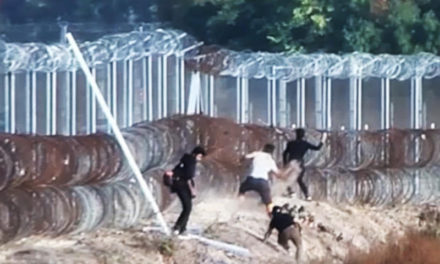In the first nine months of this year, more than twice as many illegal immigrants crossed the English Channel as in 2020, V4NA News Agency reports.
This year, twice as many people crossed the English Channel connecting the two countries as last year in total, even though only nine months have passed since 2021. On September 26, another 669 people crossed the sea on 22 boats, bringing the number of illegal migrants crossing the channel to 17,000 this year , which is more than double the 8,460 illegal migrants registered last year.
The migration situation has recently caused a lot of diplomatic tension between the two countries. The British and French interior ministers agreed in July that London and Paris will act together against the ever-increasing influx of migrants: the United Kingdom will help France with 62.7 million euros in 2021 and 2022 so that they can acquire adequate equipment. for the fight against illegal immigration. And the French Ministry of the Interior promised to increase the number of police patrolling along the coast.
Priti Patel announced the so-called Borders Bill in the summer, which aims to curb illegal migration. As part of the New Plan for Immigration, it would make it possible to track people-smuggling gangs who exploit people, as well as prevent illegal entry into the UK with tougher penalties. The British authorities have made the penalties imposed on illegal migrants and the human traffickers who help them much stricter, increasing the penalty for migrants who enter Great Britain without a permit from six months to four years , while human traffickers can face life imprisonment instead of 14 years.
Nigel Farage noticed the increasingly threatening influx of migrants , who posted on Twitter a video recording of illegal immigrants arriving from boats moored off the coast of Kent, noting that in the video he did not see the women and children that are being talked about in the media. Indeed, the footage shows vigorous young men one by one.
The ever-increasing migration pressure is not only a problem for the British, but also for Hungary's southern border. By the 38th week, the authorities had taken action in more than 79,000 cases - write the analysts of the Migration Research Institute in their quick analysis.
Janik Szabolcs , the institute's deputy director, and Róbert Gönczi, scientific assistant, wrote: this number is almost 3.5 times the time-proportionate data of last year. They believe that the increase can only be slightly related to the development of the coronavirus epidemic; there are probably other reasons behind it. They also drew attention to the fact that the Western Balkan route "does not receive nearly as much supply" from Greece as in recent years. Among the reasons for the upswing, the analysts mentioned that the migrants from the Middle East, Asia and Africa who arrived earlier are "increasingly impatient and more often and more determinedly trying to enter the territory of Hungary" in order to continue their journey towards Western Europe. Another explanation related to this could be - they wrote - that Hungary protects the southern border section more and more effectively, during which "according to the main rule" illegal arrivals are escorted back to the Serbian side, most of whom try again.
Taking these into account, Hungary will continue to play a key role in curbing irregular migration aimed at the European Union and in protecting the external borders.
Due to their European Union integration efforts, the majority of the Western Balkan states are happy to cooperate, but in many cases they do not have sufficient resources for this. On the other hand, if they cannot prevent the illegal border crossing, they are interested in the arrivals leaving their territory as soon as possible, they wrote. According to analysts, these challenges may be further aggravated in the future if a significant mass of Afghans fleeing the Taliban regime reaches the Turkish-Greek border. In this case , the big question would be how many people would eventually reach the Western Balkan route from there.
It is not only in the interest of Greece, Bulgaria or even Hungary that this does not happen: the entire EU must strive to avoid it.
Source: V4NA/Migration Research Institute/Hungarian Nation
(Headline photo: MTI/AP/Samy Magdy )












